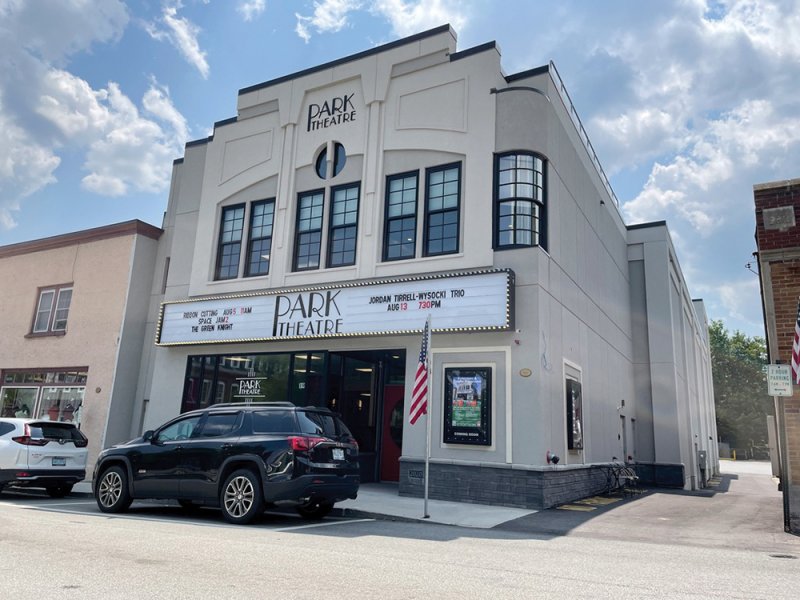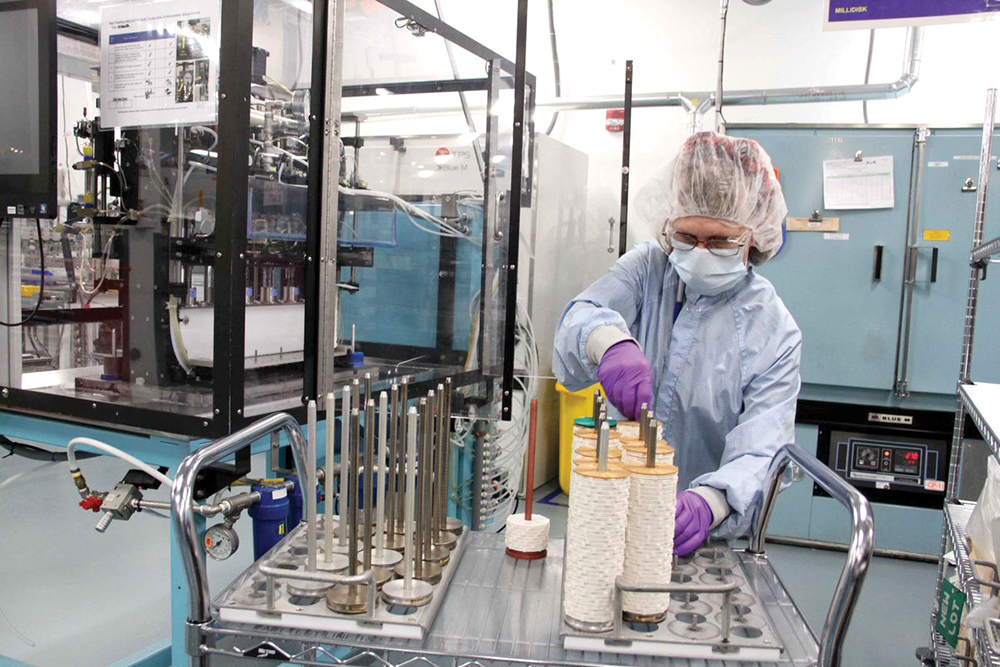
Elicia Bonham, owner of Country Bridals and Formal Wear. Courtesy photo.
When Elicia Bonham pulls into a parking lot in this everyone-knows-your-name kind of town, people recognize her “Say Yes” license plate right away. Bonham owns the Country Bridals and Formal Wear store in downtown Jaffrey, where she also grew up.
In her youth, she recalls walking home from school and stopping at the penny candy store, or perhaps the video store, the bakery or the cafe on Main Street to chat with other friends and shop owners.
Bonham, who recently purchased the wedding gown shop from her mother and founder Cathy Furze, is counting on a resurgence of foot traffic to revitalize the downtown economy.
There’s a lot to love about this beautiful spot in western NH, especially the relaxed, small town vibe, says Bonham, whose business is bustling with a packed calendar of 2022 weddings.
Lush scenery is a hallmark of this Cheshire County community of a little more than 5,000 residents that was established in 1773. White steeples, forests and scattered rivers and ponds define its bucolic landscape. About 30% of the town’s topography is conservation land surrounding one of the most popular hiking destinations in the world, the 3,165-foot Mount Monadnock. The remaining geography is zoned residential or commercial, with the majority in the former.
Like many small rural towns, Jaffrey’s economy lags behind the more populated regions of the state. After manufacturing cooled during the 80s, the town had its share of challenges. Tractor trailers amplified traffic headaches on its outdated arteries. And slow internet connections prevented many from choosing to work or live in town.
However, Jo Anne Carr, the town’s director of planning and economic development, remains optimistic. She says changes not yet apparent “could be transformative.”
One is the much-anticipated building of fiber-to-the-premises (FTTP) networks that can support gigabit speeds. Early in 2021, the town selected Consolidated Communications (CCI), and at the last town meeting in March, voters approved funding for a 10-year $1.2 million bond. There is no upfront cost to the municipality or the taxpayers, according to Carr, because CCI assumes responsibility for the bond and pays for it with a customer surcharge.
Carr says the town chose a 10-year rather than the typical 20- to 30-year bond to guard against changing technologies. “We thought, let’s get this paid off quickly,” says Carr. “And then if CCI needs to do more work, we won’t be tangled up with them for the last 10 years of the bond.”
Furze, who is also vice president of the Jaffrey Chamber, says she’s been on the town’s economic development committee working to bring fiber internet, which delivers higher speeds than DSL or cable, to Jaffrey since 2007. It’s been a long wait. Federal grants finally made it affordable, she says.
“‘Do you have high-speed internet?’ is one of the first questions prospective businesses ask, says Cyndy Burgess, president of the chamber. “They’re not willing to wait,” she says. “You know, they need it now.”
Potential downtown entrepreneurs, as well as homebuyers, are also wondering how the recently announced construction projects will affect downtown traffic. “It’s a wait-and-see game,” says Burgess. A federally funded project to construct two roundabouts will replace the five-way intersection where Routes 202 and 119, Main Street, Stratton Road and Blake Street meet.
One segment of the roundabout will connect to a new bridge over the Contoocook River; a second, to River Street. This will prevent tractor trailers from blocking traffic. It will “lighten up the downtown,” says Carr. It could, says Furze, but it could also subtract drive-by shoppers. “And while the construction is going on, people are going to avoid downtown,” she says.
About half of the population lives within a half mile of downtown, and Carr wants to make it easier for them to walk from one side of the street to the other. She cites a second transportation project to make the center of town more pedestrian friendly.
Funds from the state’s Transportation Alternatives Program will construct or rebuild sidewalks, crosswalks and bike lanes on Stratton Road and Peterborough Street. Carr expects the project to be completed in 2023.
A downtown remodel already on the ground is the new Park Theatre on Main Street, which opened in the summer of 2021 with a 333- and a 77-seat auditorium. Two other intimate 30-seat venues accommodate a film theater and a patron lounge.
The building’s design evokes an art deco motif, paying tribute to the 54-year era when the original Park Theatre, which closed in 1976, was the cornerstone for art and creativity.
“We’ve always hoped that [the theater] might be one of the anchors to attract businesses and maybe a restaurant or two,” says Burgess.

The recently redone Park Theatre. Courtesy of NHMS/Vinny Orest.
Another hurdle small businesses face is finding employees and keeping up with hourly wages, says Bonham. Although the bridal shop owner can’t compete with the high wages that local companies like Millipore and Teleflex advertise, she offers above average pay for retail. “But it cuts into my bottom line,” she says.
A tighter integration between the public school system and the business community might strengthen the labor pool, says Furze. Jobs exist here in manufacturing, retail and administration that don’t require a college degree, she says, but nonetheless cry out for professional skills. Internships can help students understand workforce basics such as showing up on time, loyalty and interviewing.
Major Companies
Graphicast, a metal castings manufacturer for medical equipment with 25 employees, rebounded from its so-called COVID slump more than a year ago and is “now sitting on the biggest backlog of orders we’ve ever had,” says CEO Val Zanchuk. “But we are shorthanded. We’re having a hard time finding people.”
The only method that works consistently is employee referrals, he says. “We have a number of employees who are related to each other.”
A four-day work week and a robust paid time off package are among the incentives that veteran Jaffrey employer, D.D. Bean & Sons Co. The 80-year-old company claims to be the world’s largest paper matchbook manufacturer.
Situated where it was founded in a 19th century textile mill off Route 202, the family-run business employs about 65 people. Third-generation CEO Chris Bean says starting salaries may be lower than at larger companies, “but if an employee works out, we build them up fast because we want to keep them.”
The pandemic, which forced restaurants and casinos to close, took a toll on the paper match industry. As it had with other setbacks, such as the decline of smoking and the arrival of the butane lighter, D.D. Bean bounced back with new strategies like manufacturing smaller batch, custom advertising matchbooks and wooden matches. This was made possible by the acquisition in 2016 of Atlas Match in Texas and Eddy Match in Canada. Bean says the company produces 100 to 150 orders a week of these smaller batches and runs two to three shifts a day to keep up with demand. “That’s a profitable end of the business, and we feel we’re in good shape,” Bean says.
Products that ignite a flare are behind another family-owned Jaffrey business, Atlas PyroVision Entertainment, the largest fireworks display company in New England. As with any industry relying on in-person events, the pandemic ripped into its sales, causing Atlas in 2020 to lose 92% of its bookings compared with 2019 and 20% in 2021. It performs around 750 professional shows annually.
In the face of lockdowns, consumers hankered for at-home fireworks. That became “our saving grace,” says CEO Stephen Pelkey, who is also president of the American Pyrotechnics Association. Atlas sells fireworks and related products at its four NH brick-and-mortar stores in Amherst, Belmont, Newport and Rindge.
On top of the event cancellations, Atlas experienced shipping delays from China, where 97% of fireworks are manufactured, according to Pelkey. As a general rule, Atlas prepares its inventory 18 months in advance to ward against disruptions. That gave the company, with 28 full-time and 450 seasonal employees, an edge for 2021. However, a second wave of bottlenecks brings uncertainty for 2022.
Atlas has been expecting nine 40-foot ocean container shipments of products since last June. One was shipped; the company awaits the other eight. Pelkey says the shipment costs per container more than tripled from $10,000 to $36,000. “We’re inventoried well enough that we’re able to weather a pretty good storm, but it can’t be sustained [indefinitely],” he says.
Jaffrey’s largest employer, MilliporeSigma, a life sciences division of Merck KGaA Darmstadt, Germany, manufactures membranes and filters for biopharmaceuticals, including products used in the making of COVID vaccines.

An employee working at MilliporeSigma. Courtesy photo.
Due to increased demands, Millipore is looking to add another 230 employees to its Jaffrey plant, which houses just over 1,300 workers. Strong partnerships with universities help feed the engineering pipeline. However, filling manufacturing positions is more of a challenge, says plant manager David Poggi. To boost its recruiting efforts, the company is hosting “Move with MilliporeSigma” events nationally and offering relocation bonuses of up to $10,000, along with provisions for temporary housing in nearby towns like Keene and Peterborough. To date, the country-wide endeavor has mobilized 50 newbies to Jaffrey.
Historically, manufacturing operators come from a 20-mile radius, says Poggi. Now the company is bringing in people from various regions and backgrounds. “It’s going to be great for the site,” he says. “With more diversity, there’s increased energy.”
Housing Woes
A common issue Millipore and other manufacturers face is the lack of housing. The regional economy can’t grow unless incoming employees have an affordable place to live. “It’s without a doubt going to be something we have to figure out with state and local officials,” Poggi says.
Larry Alvarez of Tieger Realty in Jaffrey echoes what most other agents report: an imbalance of inventory and buyers. Companies like Millipore and Teleflex, a medical manufacturer of custom extrusions and complex catheters, are growing, he says, “and we don’t have enough housing for all these people [new employees].”
Alvarez says the last decade’s upturn in real estate prices didn’t hit Jaffrey until about two years ago, and homes are comparatively less expensive than other areas in the state. For example, a home on the Seacoast that commands $700,000 may only go for $450,000 to $500,000 in Jaffrey. That’s good news for the buyers that can afford that much; however, it deters housing developers looking for a return on their investments as the costs to build roads and install sewer and water lines are on the rise, as is the cost of lumber.
Rental vacancies are rare. Carr says the town’s zoning board increased the density allowance from one unit to six units per acre for parcels that access the town’s water and sewer system. Anything that qualifies as workforce housing by HUD guidelines is allowed an additional two units. The town approved the change in March 2021.
About a quarter of the 600 rental units are subsidized, and Carr acknowledges several private parcels of land are for sale, but she doesn’t know if developers are biting.
Zanchuk of Graphicast is hoping to receive a variance for an industrial-zoned three-plus acre parcel on the company’s property so he can build 24 to 32 townhouse rental units.
Zanchuk has been seeking advice from Keith Thibault, chief development officer of Southwestern Community Services, a community action organization serving Cheshire and Sullivan counties. A variance is only one step forward. Recruiting a developer is the bigger hurdle. “The costs of [real estate] development are really unlike anything we’ve seen before,” Thibault says.
250th Jubilee
Jaffrey reaches a milestone in two years when the town honors its 250th anniversary. Stephanie Porter, director of TEAM Jaffrey, a group that promotes the downtown, says an Oktoberfest in 2022 will kick off a series of monthly events, including concerts, carnivals and parades, with the official commemoration in August 2023.
She hopes the resulting fanfare, in conjunction with the completed construction projects and a flourishing theater, will attract more businesses—bars, restaurants, and other nightlife venues—that make visitors want to linger and splurge.

A vendor selling wreaths at Team Jaffrey’s Summer Farmers Market. Courtesy of TEAM Jaffrey.
